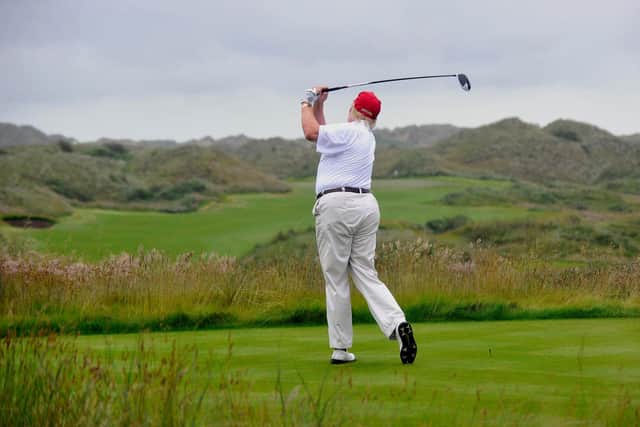US lawsuit puts Donald Trump's Scottish resorts under scrutiny
In 2018, when Trump was in office, The Scotsman reported how he told the US Office of Government Ethics that Turnberry, his flagship international property, together with his Aberdeenshire business, had generated £17 million a year. In actual fact, the UK accounts showed their collective turnover was just £11.6m, with combined losses of £19m.
Back then, ethics observers described Mr Trump’s disclosures as “error-ridden, deliberately obfuscatory, and incomplete”. Now one of the most powerful legal figures in the US has gone further.
Advertisement
Hide AdAdvertisement
Hide AdThe very foundation of Mr Trump’s purported wealth, according to Letitia James, the New York Attorney General, is “rooted in incredible fraud and illegality”.
The lawsuit filed against Trump on Wednesday evening by Ms James’s office could be devastating for the former US president. She has accused him of cheating the system by falsely inflating his net worth by billions of dollars so as to enrich himself, secure favourable loans and pay less tax.
In a significant escalation of the legal woes facing Mr Trump, his family and his eponymous firm, the detailed lawsuit filed by Ms James’s office alleges widespread business fraud involving some of the Trump Organisation’s most prized assets.
Mr Trump and his legal team have denied any wrongdoing and dismissed Ms James’s efforts as a politically motivated “witch hunt”.
While much of the attention has focused on Mr Trump’s US properties, the 222-page complaint also focuses on his Scottish businesses.


Ms James’s office said the value of Mr Trump’s inaugural Scottish golf resort in Balmedie, Aberdeenshire – a business that has never turned a profit since it was incorporated 17 years ago – was “improperly and materially” inflated.
The lawsuit alleges in documents known as statements of financial condition, prepared by Mazars, a US accounting firm, Mr Trump based the value of the Aberdeenshire course on his capital contributions, adjusted by a ‘multiplier’ – a fixed assets approach that did not depreciation of the assets into account.
According to the document, Mr Trump valued the resort in 2014 at $435,562,426 (£385.5m).
Advertisement
Hide AdAdvertisement
Hide AdSuch figures are blatantly contradicted by Mr Trump’s filings to authorities in the UK; the Trump International Scotland accounts for the same year, filed with Companies House, stated the firm had tangible assets of just £30.3m, with ‘land and buildings’ worth just over £29m.
That is not the only anomaly. Mr Trump’s 2014 valuation assumed as many as 2,500 homes could be built. Where that figure came from is a mystery.
As part of the original outline planning permission secured by the Trump Organisation at Balmedie back in 2008, there was to have been four blocks of 950 timeshare flats, 500 ‘exclusive’ homes and 36 villas.
Those plans only provided for 1,486 properties and, even then, they were never realised. Three years ago this week, the Trump Organisation won permission for a smaller housing development at Balmedie, consisting of 500 luxury detached homes and 50 holiday villas. To date, not a single unit has been built.
Even after Mr Trump’s firm made clear it was planning to build a more modest development, his statements of financial condition continued to vastly overstate the number of units that would be created.
In 2019, for example, the undeveloped land at Balmedie was valued at £195m on the basis that up to 2,035 homes could be built. As with the 2,500 figure, the rationale for this number is non-existent.
Ms James’s lawsuit also alleges the Trump Organisation made use of the fixed asset scheme to report “materially false and misleading” values for its Turnberry golf course, ranging between £109m and £112m.
Such sums, Ms James’s office added, did not factor in any depreciation of the assets, save for a statement prepared in 2021. “The golf course should have been valued at a much lower figure,” the lawsuit notes.
Advertisement
Hide AdAdvertisement
Hide AdOnce again, those valuations are sky high compared to what Mr Trump’s firm at Turnberry has told Companies House. The most recent accounts state the net book value of Turnberry’s tangible fixed assets – that means other buildings and developments as well as its golf courses – is just £24.6m.
Since Turnberry was purchased by Mr Trump in 2014, it has run up losses totalling nearly £50m.
Although the lawsuit is a civil case, meaning no criminal charges have been brought, the potential sanctions outlined by Ms James are extensive.
As well as seeking the recovery of more than £220m, she wants to effectively remove the Trump family from businesses tied up in the allegations, with an independent monitor appointed for no less than five years to oversee the Trump Organisation's compliance, financial reporting, valuations and disclosures to lenders, insurers and tax authorities.
On top of that, she wants to bar Mr Trump and the Trump Organisation from entering into commercial real estate acquisitions for five years, from obtaining loans from banks in New York for five years and permanently bar Mr Trump and his three eldest children from serving as an officer or director in any New York corporation or similar business entity registered and/or licensed in New York state.
Ms James’s office is also seeking to replace the current trustees of Mr Trump's revocable trust, which controls his business interests, with an independent trustee.
The latter threat, if realised, could have ramifications for Mr Trump’s Scottish entities. Golf Recreation Scotland Limited, the parent company of Trump Turnberry, has been loaned more than £113m by the trust.
What could happen to that money – and Turnberry – if Ms James has her way? Would an independent trustee be content to continue funnelling money into a company that has made sustained and heavy losses? They are among several questions thrown up by a lawsuit that puts Mr Trump’s business empire under scrutiny like never before.
Comments
Want to join the conversation? Please or to comment on this article.
